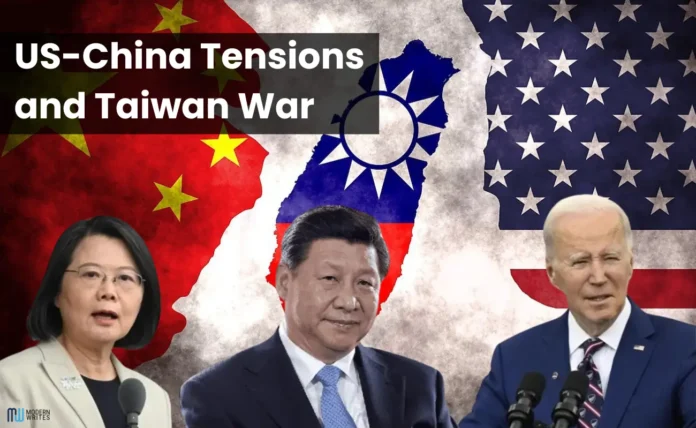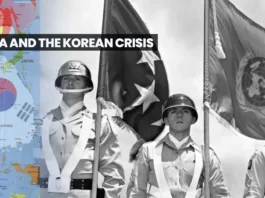US-China Tensions and Taiwan War
The possibility of a military confrontation between the United States and China over the War Over Taiwan has surfaced as a potential issue. As such, the amount of conflict between the two countries has grown significantly in recent years. Taiwan, as a potential locus of armed confrontation between the two powers, constitutes an area of very high tension due to its strategic importance, historical enmity, and human ambitions. However, because of this, Taiwan is currently at the epicenter of the conflict. This article examines the subtlety of the issue at hand. This article also examines the factors that contribute to tensions and the possibility of a military conflict. US-China Tensions and Taiwan War
U.S.-Taiwan Relations US-China Tensions and Taiwan War
- In 1979, the United States made its most recent official diplomatic contact with Taiwan, establishing an unofficial and robust diplomatic relationship. This includes arms sales, and it may even include financial support for Taiwan for security purposes.
- The Taiwan Relations Act is the basis for United States defense assistance to Taiwan. It unites the US and Taiwan, despite American reluctance to engage in formal diplomatic relations with Taiwan. US-China Tensions and Taiwan War
Historical Context US-China Tensions and Taiwan War
From the very beginning, after the Chinese Civil War ended in 1949, with the Nationalist forces losing and later establishing their base in Taiwan, the issue of Taiwan has remained a puzzle. Although Washington has recognized Beijing as the legitimate authority of China since 1979, Washington has given low-level recognition to Taipei as the capital of Taiwan and often worked with Taipei by shipping weapons and providing assistance.
As for China, since they view Taiwan as a crucial part of their territory, they cannot rule out the application of force to bring it into harmony. China views any attempt to achieve its independence as a violation of the red line.
Escalating Tensions
In the era of recent political changes, there has been an improvement in China’s economic and political positions in the Association of Southeast Asia Region, as well as a change in the United States under President Obama’s leadership in orienting towards the Asia region. The Trump administration’s moves to strengthen US military ties with Taiwan, such as the War Over Taiwan, have further aggravated the situation.
The US signed a deal with Taiwan to accidentally step up its military tie-ups, such as arms sales, and boost political engagement with Taiwan and its officials, intensifying the crisis. The United States and its regional allies in the Pacific Ocean have questioned the true purpose of Chinese efforts to modernize and extend its military, particularly the naval force, so as to relocate Taiwan into its realm. US-China Tensions and Taiwan War
Strategic Stakes US-China Tensions and Taiwan War
The USA is deeply concerned about the developments in the Taiwan Strait that may hamper the transatlantic security of the US and its allies in the Asia-Pacific region, which is why it is absolutely vital to preserve peace and order. The War Over Taiwan could have a much wider impact, as it may possibly lead to the region’s destabilization and disruption of supply chains, especially in the manufacturing sector and high-tech.
The United States’ involvement in China could help it achieve its strategic goal of establishing its authority in this region beyond its immediate borders and possibly beyond. Controlling Tibet is one of China’s key objectives because it contributes to the achievement of these objectives. US-China Tensions and Taiwan War
Pathways to conflict US-China Tensions and Taiwan War
Together with the high possibility that a military collision regarding Taiwan could happen, it is difficult to absolutely banish the likelihood of one. Should diplomatic avenues prove ineffective in resolving the situation, tension is likely to escalate. The consequences of the war could spread quickly without managing the mistake or accidental move on any side of the art, such as a military incursion on the other side or a provocation from the other side.
In the context of the Taiwan Relations Act, which guarantees the United States’ interest in Taiwan’s defense and the country’s key role in the region, it is expected that Washington may be forced to intervene against China in cases of coercive reunification. People have questioned why Beijing is growing more powerful by using its military to uphold its claims against other nations, including Taiwan.
A few critics have issued the warning that peaking emissions is just the start of a long road, while others say China could choose a ‘use it or lose it’ approach. The main point here is that, regardless of whether or not a war over Taiwan becomes part of the future, it still remains a major question mark that hangs over everyone, accompanied by anxiety about its occurrence. US-China Tensions and Taiwan War
It is crucial to reduce diplomatic tensions as this could lead to a peaceful resolution of the Taiwan issue. Furthermore, I believe it is essential to consider the risks and impacts of the conflict’s complex nature on the concerns of all parties.
While both the United States of America and China can incur significant losses in the event of a war with Taiwan, there are ways that the two most powerful nations in the world can ensure we attain secure international peace and thrive. The implications of this conflict are huge, and we must pay the most attention to finding a peaceful way that completely resolves this matter after many years. US-China Tensions and Taiwan War




